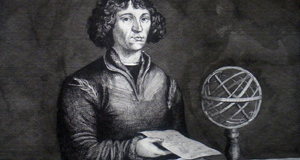Room for DebateDebating the Existence of God: God Exists
By
2014, Vol. 6 No. 03 | pg. 1/2 | »
KEYWORDS:
The debate between science and religion over the existence of a higher power often leads to little more than a shouting match. We become so emotionally invested in our personal opinions of whether or not God exists that when presented with dissenting points of view, all civility is thrown out the window and the opportunity for civil discourse is lost. Theists of all creeds and faiths and atheists of all shapes and sizes spend their days on the internet or at Starbucks debating one of the biggest inquiries in human existence: does God exist? But in this brief commentary, I will assert that you can find evidence for the subjective belief in a deity within the objective realm of science, while attempting to debunk many arguments used by Atheists in order to disprove the existence of God. By breaking down the arbitrary barrier between science and religion, I argue that science compliments the existence of a God instead of acting as a vehicle for disbelief. In the 21st century, a great polarization has occurred between religion and science. Yet the assertion in this paper is that this need not be the case. I assert the claim that despite the common misconception stating otherwise, science yields to humans’ answers suggesting that the universe and humans have a design, and that that design was created by something other than chance.  Biblical illustration of Book of Genesis Chapter Two. Credit: Digital Shores Media/Sweet Publishing.
Biblical illustration of Book of Genesis Chapter Two. Credit: Digital Shores Media/Sweet Publishing.
Discordance between science and religion did not always exist. According to “The Scientific Revolution” by Steven Shapin, prior to the enlightenment era of the 17th century, The Catholic Church often adopted and integrated many theories found in literary works of natural philosophy (now known as science) written by philosophical greats like Aristotle and Ptolemy (Shapin). Science is the study of the inner-machinations of the world around us and the reality we occupy. At the core of religion you can find the same type of inquiries, but those with faith assert that there is a higher force or being that created the laws of nature and the structure of our reality. This idea is known as intelligent design. Many scientists and atheist scholars consider this type of thinking to be a “pseudoscience” or a vehicle for religious thought. Two secular authors by the name of Tanis Eder and Matt young co-wrote a book denying intelligent design titled “Why intelligent design fails : a scientific critique of the new creationism.” In this work Young claims that “Nevertheless, we argue that pseudoscience can be a useful term. If the intelligent-design advocates advertise themselves as doing science, even when their practices are far from the customary intellectual conduct of mainstream science, we can and should aspect that intelligent design is not actually science” (Young 186.) The critique asserted here is that intelligent design strays away from empirical science and objective fact when it states that a designer created the universe that we inhabit. One of the many claims vehement atheists will make is that science can stand on its own, while religion needs the “crutch” of a higher being to explain what happens in our universe. However, hundreds of years of scientific inquiry regarding how the universe works have yielded an amalgamation of uniform results that dictates our world. If mere coincidence had constructed our world the results would be chaotic. The uniformity of the laws of physics and the order of our reality suggest that it was created by something; be it god or some ambiguous force with an affinity for organization. These laws and rules have created a universe that is capable of supporting life that is also complex in its design. Physicist Paul Davies writes in his article “How Bio-Friendly is The Universe” that “There is now broad agreement among physicists and cosmologists that the Universe is in several respects ‘fine-tuned' for life". These infallible laws not only imply design in their rigidity, but also in their capacity to create an environment that can sustain life. Intelligent design still adheres to the same rules and methods of science, but it posits that the orderly nature of the universe and the near flawless complexities of our reality imply that a design must exist, for our reality is far too complex to have happened by chance. Within the science versus religion debacle lies an innumerable subset of arguments regarding causation and design. Theists claim that the act of conception, the formation of life, and the human form itself are far too complex and organized to have happened by mere coincidence. Atheists will assert that the three aforementioned examples are the byproduct of evolution and natural selection. In “The Return of the God Hypothesis” by Stephen Meyer, Meyer elaborates on how certain scientists viewed evolution as being an autonomous force independent of a higher being. Meyer states in his work that “Darwin’s theory suggested that living organisms only appeared to be designed and that the mechanism of natural selection sufficed to explain that appearance” (Meyer 2.) According to atheists science shows us that eons of evolution and natural selection have yielded the complex and intelligent human beings that we are today. These arguments seem to be entirely mutually exclusive, but when examined closely their differences become incredibly minute. Natural selection has created a complex being capable of high cognitive thought and reasoning, and although humans are far from perfect, the complexities of our anatomies suggest that there may be more at play here than chance alone. Harold Schilling writes in his book “Science and Religion” that “Surely there can be neither logical contradiction nor clash of ideals in accepting both a biological conception of life based on microscopic observations and chemical analyses, and a religious conception of it derived from living, and from a reflection upon its meaning ultimately.” (Schilling 32.) Through experimentation, history, and technological advancements science has been able to better understand the complexities of the human being and the nature of conception. Theists view life as a creation made by God in his image. Atheists and theists often refuse to see any common ground in regards to this topic, but when combined these two points make much more logical sense. If viewed together, we see that evolution can be seen as the vehicle for God’s design, a medium for its creation. Evolution can surely be seen as an autonomous force driven by natural selection. Natural selection is evident and observable to an extent, but if natural selection alone was the cause for our evolution as a species as well as others, one should expect more anomalies. Instead, humans have evolved into complex beings that inhabit a planet suitable to their growth and development. The truly complimentary nature of evolution and creationism is not the only place you can find evidence for the existence of a higher being. As mentioned before, the universe adheres to a strict set of laws that dictate our reality. The laws of physics are a consistent set of rules that cannot be broken. For example, gravity is infallible and it never ceases to act according to its subset of rules unless acted upon by an outside force. Say you find yourself precariously perched on a ladder, and with an unfortunate misstep suddenly you find yourself no longer on said ladder. The uniformity of the laws of physics would assert that you are going to become better acquainted with the concrete fairly quickly. At no point would you instead float away into the sunset. Coincidence breeds chaos, not rigidity. If these laws were created as I am asserting, then it would make sense that the creator would never desire to break them. Don Page writes in his article “A theological argument for an Everett Multiverse” that “God seems loathe to violate elegant laws of physics that He has chosen to use in His creation, such as Maxwell's equations for electromagnetism or Einstein's equations of general relativity for gravity within their classical domains of applicability, even if their violation could greatly reduce human suffering (e.g., from falls)” (Page 1). In this article Page elaborates on the “mathematical elegance” of the universe and that its intricacies imply that these laws were designed in order to support life and maximize hospitability throughout our universe. After all, life on Earth would be difficult and far more interesting if the laws of physics were less rigid in their design. In the midst of these arguments surrounding the existence of god or lack thereof, atheists will often assert that religion is detrimental to humankind. Thus a God could not exist, because logically if religion (the study and praise of a particular God) is poisonous to humankind, God itself must also be detrimental to the existence of man. Throughout history we have seen some of the bloodiest wars fought in the name of a God. Famed Atheist scholar Richard Dawkins states in his article “Is Science a Religion?” that anyone “looking at Northern Ireland or the Middle East, can be confident that the brain virus of faith is not exceedingly dangerous? One of the stories told to the young Muslim suicide bombers is that martyrdom is the quickest way to heaven..” (Dawkins 2.) Here Dawkins is elaborating on the capacity for violence that religion has shown to have since humans first began questioning their purpose on Earth. These scholars do seem to have a point, terrorism, civil wars, and genocide have all been committed in the name of a God at some point in history. This poses a large problem for the logical assertion made by those who support the intelligent design theory. If a God designed the universe and the world, why would he allow the beings who inhabit it to kill in his name? An argument is also made that instead of fostering intellectual development and growth, religion has stifled the progression of human ingenuity and thus limits our capacity as functioning beings. In the eyes of some atheist scholars religion is a deterrent for human advancement. Atheist author Stephen Pastore writes in his article “The Tragedy of Religion Stifling Science” “Imagine if the church had embraced discovery instead of persecuting scientists and other innovative thinkers. We would be a thousand years ahead of where we are now! Imagine humanity a thousand years into the future.” (Pastore) If this is true, it also poses a logical conundrum for intelligent design. If a God designed the universe to be hospitable for humans and conducive to a progressive environment, it would be illogical for the institution that supports that being to stifle aforementioned growth and progression. Pastore and many other atheist authors and scholars assert that if religion had been removed from the Dark Ages, human advancement would be much further than where it is today.Continued on Next Page » Suggested Reading from Inquiries Journal
Inquiries Journal provides undergraduate and graduate students around the world a platform for the wide dissemination of academic work over a range of core disciplines. Representing the work of students from hundreds of institutions around the globe, Inquiries Journal's large database of academic articles is completely free. Learn more | Blog | Submit Latest in Opinion |


















